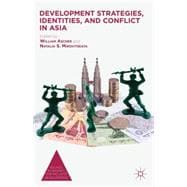Development Strategies, Identities, and Conflict in Asia explores the links between Asian governments' development strategies and the nature and dynamics of inter-group violence. The overview chapters comprehensively assess the development doctrines, patterns of development, and levels and nature of violence in all Asian subregions, while case-study contributions focusing on eight countries explore the often surprising impacts of development initiatives on reducing or increasing inter-group conflict and violence ranging from West Asia to Southeast Asia. The variations in strategies and their impacts on multiple risks of violence can guide policymakers, development professionals, and activists committed to conflict-sensitive development.








